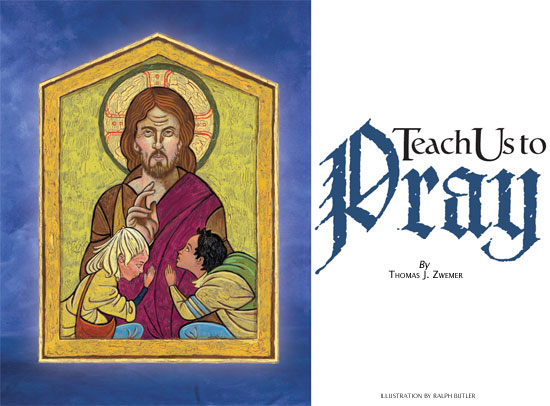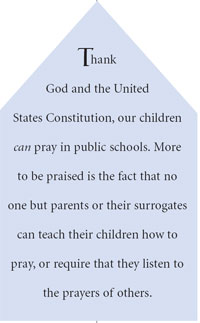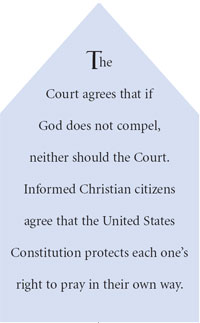Teach Us to Pray
Thomas J. Zwemer January/February 2006
The increasing attempts by many "good people" to Christianize the United States by law rather than by evangelism has even reached the Supreme Court. The gospel commission given by Jesus is "Go ye therefore, and teach all nations," not "Go ye therefore, and compel all nations!" Even though we see what religion in government can do in the Middle East, many want to do the same here. The United States is one of the most devout nations in the world, and it is at the same time the most religiously diverse. The United States has more than 1,500 different religious bodies and sects—including 75 divisions of Baptists alone. This country has 360,000 churches, mosques, and synagogues [including independent storefront churches], all coexisting in relative harmony. There are, for example, 193 churches, synagogues, mosques, and temples listed in the Augusta, Georgia, Yellow Pages. There are five non-Christian churches listed, eleven Baptist, three Catholic, even two Presbyterian—the "right" one and the "wrong" one!

So it ought to be a slam dunk to bring prescribed prayer into the public schools. But here is the rub! Each believes that they alone are "right" and the prayers of other belief systems are wrong and thus ineffectual! Furthermore, each believes that support or recognition of any other "faith" is a disservice to the "truth." Thus the 10 percent who don't pray are the largest single group of Americans..
Just consider this: A neighbor and friend of mine is a member of the Jehovah's Witnesses and teaches public school. Colleagues of mine have wives who teach public school. Some are members of the Church of Jesus Christ of Latter-Day Saints; others are Roman Catholics, who pray to "Mary, Mother of God." Others are Unitarians, who don't believe in the Trinity or the Apostles' Creed. Still others are Muslims, Buddhists, Hindus; yet others are agnostics. An acquaintance in Augusta who is a Christian Scientist prays to a Mother God. Which of these people would you want
to compose the morning prayer for your children?
Thank God and the United States Constitution, our children can pray in public schools. More to be praised is the fact that no one but parents or their surrogates can teach their children how to pray, or require that they listen to the prayers of others. The United States Constitution protects "captive" individuals from listening to or participating in sponsored prayer in any government-related event. Our Founders found King George's church as odious as King George's tax laws. They were of a mind that salvation is through God alone to individuals alone. Accordingly, prayer is a private conversation between the individual and God. Corporate prayer is effectual only if the group in free association is in consensus. The founders of our nation felt so strongly they fashioned the provision for the constitutional right to private prayer with equal shelter from imposed prayer.
Accusations are totally unfounded that some nefarious group moved the United States Supreme Court to deny private prayer in public places. The Court simply states that the civic right to pray and the civic right not to pray or to be part of an audience to public governmentally sponsored prayer are both protected. The Court agrees that if God does not compel, neither should the Court. Informed Christian citizens agree that the United States Constitution protects each one's right to pray in their own way.
United States Constitution
Amendment I
"Congress shall make no law respecting an establishment of religion, or prohibiting the free exercise thereof; or abridging the freedom of speech, or of the press; or the right of the people peaceably to assemble, and to petition the government for a redress of grievances."
Would reciting the Apostles' Creed be the establishment of religion? Our Jewish and Baptist friends would be outraged.
Would reciting the Lord's Prayer be the establishment of religion? Certainly our Jewish friends would object!
Would saying the rosary be the establishment of religion?
How about just a Hail Mary: Hail Mary, full of grace, the Lord is with thee; blessed art thou among women, and blessed is the fruit of thy womb, Jesus. Holy Mary, Mother of God, pray for us sinners, now and at the hour of our death. Amen.
What about the Islamic prayer said five times daily—at least three of those occurring during school hours:
Allah is most great, Allah is most great.
Allah is most great. Allah is most great.
I testify that there is no god except Allah.
I testify that there is no god except Allah.
I testify that Muhammad is the messenger of Allah.
I testify that Muhammad is the messenger of Allah.
Come to prayer! Come to prayer!
Come to success [in this life and the hereafter]
Come to success!
Allah is most great. Allah is most great.
There is no god except Allah.
As Christians we are often invited to ask: What would Jesus do?
Let us take a look at what Jesus did!
First, Let Us Define a Christian
The name Christian means one who rejoices in the gospel of the covenant of redemption. Such a one accepts, trusts, and believes in the claims of Jesus of Nazareth as the Son of God, the Messiah, the Savior of humanity, the mentor to all those who believe in Him, the advocate with the Father, and the coming King of kings and Lord of lords.
What Jesus Did
Jesus of Nazareth announced His identity and mission in His hometown on the Sabbath day in the local synagogue. Luke records the announcement as follows:
"And he came to Nazareth, where he had been brought up: and, as his custom was, he went into the synagogue on the sabbath day, and stood up for to read. And there was delivered unto him the book of the prophet Esaias. And when he had opened the book, he found the place where it was written, The Spirit of the Lord is upon me, because he hath anointed me to preach the gospel to the poor; he hath sent me to heal the brokenhearted, to preach deliverance to the captives, and recovering of sight to the blind, to set at liberty them that are bruised, to preach the acceptable year of the Lord. And he closed the book, and he gave it again to the minister, and sat down. And the eyes of all them that were in the synagogue were fastened on him. And he began to say unto them, This day is this scripture fulfilled in your ears" (Luke 4:16-21).*
Christ's public ministry began with His sermon on the mount. He opened with the Beatitudes, which are, in reality, a statement of His character, and secondarily the characteristics of those who have accepted Christ as their personal Savior. The lifestyle of the forgiven is to give in the same abundance as they have been given! In His sermon Jesus went on to explain the full meaning and intent of the law. His law governs a person's thoughts, laying waste to the hypocrisy of self-righteousness. Christ continued by outlining a lifestyle of humility, charity, and forgiveness—a morality that exceeds the conventional understanding of the law. He closed with a parable that highlights the assurance given to those who accept His righteousness and build their lives on the rock of His acceptance, the perfection of His life, and the completeness of His redemption. Such are eternally safe through the storms of life.

Jesus made a continuing point of forgiveness and the lifestyle of the forgiven, as in His conversation with Simon at Simon's feast in honor of Jesus, at which Simon had silently criticized Mary.
"And Jesus answering said unto him, Simon, I have somewhat to say unto thee. And he saith, Master, say on. There was a certain creditor which had two debtors: the one owed five hundred pence, and the other fifty. And when they had nothing to pay, he frankly forgave them both. Tell me therefore, which of them will love him most? Simon answered and said, I suppose that he, to whom he forgave most. And he said unto him, Thou hast rightly judged" (Luke 7:40-43).
Jesus did the same in His parable of the two debtors.
"Therefore is the kingdom of heaven likened unto a certain king, which would take account of his servants. And when he had begun to reckon, one was brought unto him, which owed him ten thousand talents. But forasmuch as he had not to pay, his lord commanded him to be sold, and his wife, and children, and all that he had, and payment to be made. The servant therefore fell down, and worshipped him, saying, Lord, have patience with me, and I will pay thee all. Then the lord of that servant was moved with compassion, and loosed him, and forgave him the debt. But the same servant went out, and found one of his fellowservants, which owed him an hundred pence: and he laid hands on him, and took him by the throat, saying, Pay me that thou owest. And his fellowservant fell down at his feet, and besought him, saying, Have patience with me, and I will pay thee all. And he would not: but went and cast him into prison, till he should pay the debt. So when his fellowservants saw what was done, they were very sorry, and came and told unto their lord all that was done. Then his lord, after that he had called him, said unto him, O thou wicked servant, I forgave thee all that debt, because thou desiredst me: Shouldest not thou also have had compassion on thy fellowseverant, even as I had pity on thee?" (Matthew 18:23-33).
Jesus used the same logic in His description of the day of judgment.
"When the Son of Man comes in his glory, and all the angels with him, he will sit on his throne in heavenly glory. All the nations will be gathered before him, and he will separate the people one from another as a shepherd separates the sheep from the goats. He will put the sheep on his right and the goats on his left. Then the King will say to those on his right, 'Come, you who are blessed by my Father; take your inheritance, the kingdom prepared for you since the creation of the world. For I was hungry and you gave me something to eat, I was thirsty and you gave me something to drink, I was a stranger and you invited me in, I needed clothes and you clothed me, I was sick and you looked after me, I was in prison and you came to visit me.' Then the righteous will answer him, 'Lord, when did we see you hungry and feed you, or thirsty and give you something to drink? When did we see you a stranger and invite you in, or needing clothes and clothe you? When did we see you sick or in prison and go to visit you?' The King will reply, 'I tell you the truth, whatever you did for one of the least of these brothers of mine, you did for me.' Then he will say to those on his left, 'Depart from me, you who are cursed, into the eternal fire prepared for the devil and his angels. For I was hungry and you gave me nothing to eat, I was thirsty and you gave me nothing to drink, I was a stranger and you did not invite me in, I needed clothes and you did not clothe me, I was sick and in prison and you did not look after me.' They also will answer, 'Lord, when did we see you hungry or thirsty or a stranger or needing clothes or sick or in prison, and did not help you?' He will reply, 'I tell you the truth, whatever you did not do for one of the least of these, you did not do for me.' Then they will go away to eternal punishment, but the righteous to eternal life" (Matthew 25:31-46).